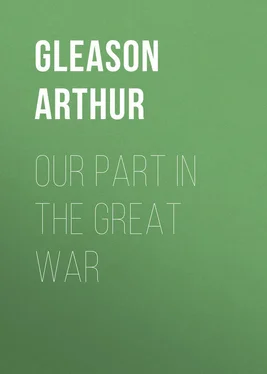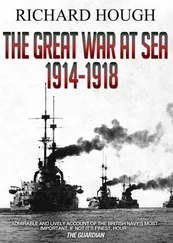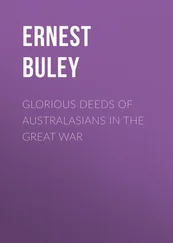Arthur Gleason - Our Part in the Great War
Здесь есть возможность читать онлайн «Arthur Gleason - Our Part in the Great War» — ознакомительный отрывок электронной книги совершенно бесплатно, а после прочтения отрывка купить полную версию. В некоторых случаях можно слушать аудио, скачать через торрент в формате fb2 и присутствует краткое содержание. Жанр: foreign_antique, foreign_prose, на английском языке. Описание произведения, (предисловие) а так же отзывы посетителей доступны на портале библиотеки ЛибКат.
- Название:Our Part in the Great War
- Автор:
- Жанр:
- Год:неизвестен
- ISBN:нет данных
- Рейтинг книги:5 / 5. Голосов: 1
-
Избранное:Добавить в избранное
- Отзывы:
-
Ваша оценка:
- 100
- 1
- 2
- 3
- 4
- 5
Our Part in the Great War: краткое содержание, описание и аннотация
Предлагаем к чтению аннотацию, описание, краткое содержание или предисловие (зависит от того, что написал сам автор книги «Our Part in the Great War»). Если вы не нашли необходимую информацию о книге — напишите в комментариях, мы постараемся отыскать её.
Our Part in the Great War — читать онлайн ознакомительный отрывок
Ниже представлен текст книги, разбитый по страницам. Система сохранения места последней прочитанной страницы, позволяет с удобством читать онлайн бесплатно книгу «Our Part in the Great War», без необходимости каждый раз заново искать на чём Вы остановились. Поставьте закладку, и сможете в любой момент перейти на страницу, на которой закончили чтение.
Интервал:
Закладка:
Ambulance work depends on the supply of gasoline, oil, carbide and spare parts, solid rations and sleep. Success rests in patching tires, scraping carbon and changing springs. Any idea of ambulance work is off the mark that thinks it a succession of San Juan charges. It is hard, unpicturesque work, with an occasional fifteen minutes of tension.
"A stretcher makes a serviceable bed, and, warmly wrapped in blankets, one can sleep very comfortably in an ambulance."
"A climb of 800 meters in less than 10 kilometers involves mechanical stress."
"The unique spring suspension and light body construction make our cars the most comfortable for the wounded of all the types in service."
A mechanical detail – but it is in these bits of ingenious mechanical adaptation to human needs that the American contribution has been made. It isn't half enough in a machine-made war to be dashing and picturesque. You must fight destructive machinery with still cleverer engines of relief. The inventive brain must operate as well as the kind heart and the spirit of fearlessness. It is in the combination of courage and mechanical versatility that the best of the American quality has been revealed.
Flashes of the soldier life are given by the boys. Canned beef is called by the poilu "singe," or monkey meat.
"All that is impossible is explained by a simple 'c'est la guerre.' Why else blindly scrape one's way past a creaking truck of shells, testing 20 horses, two abreast, steaming in their own cloud of sweaty vapor? Why else descend slopes with every brake afire, with three human bodies as cargo, where a broken drive shaft leaves but one instantaneous twist of the wheel for salvation, a thrust straight into the bank, smashing the car but saving its load? 'C'est la guerre.'"
"'Chasseurs Alpines': a short, dark-blue jacket, gray trousers, spiral puttees, and the jaunty soft hat 'bérets.' These are the famous 'blue devils.'"
"I, who came for four months and have been working eight, can assure any one who is considering joining the American Ambulance that he will go home with a feeling of great satisfaction at having been able to help out a little a nation that appreciates it, and that is bearing the brunt of the fighting on the Western Front."
"Among the wounded that our cars carried, was the General of the Division – General Serret" – brought down from the height he had held to be amputated and to die.
Another section of twenty-four cars started in at Esternay at the time of the spring freshets, when life was chilly and wet. Eleven received individually the Croix de Guerre. This section served two divisions of the second French Army and had a battle front of from seven to ten miles – the St. Mihiel sector, a region subject to artillery fire. It has been commanded by Oliver Hazard Perry, a descendant of Commodore Perry.
They had 1,800 wounded a week, and a mileage of 5,000 kilometers.
"Sudbury broke his arm cranking, this morning."
The service was brisk. Shroder with two wounded was rounding a corner when a shell hit so close as to jump his car up. One car came in from service in July with 23 shrapnel holes. On July 8, within 24 hours, the boys of this section carried 997 wounded.
"During the bombardment the trenches were so smashed by continuous fire as to cease to be trenches: the men lay in holes in the ground. They would come down when relieved, dazed and sometimes weeping, yet they held their ground." Long waits and frantic activity: dullness and horror alternating. Nine members of the ambulances were in the house against which a shell exploded. A soldier was killed and one mortally wounded. The Americans were thrown in a heap on the floor. "Now, the section occupies a large house just outside the town. There is a large hole in the garden where a shell alighted soon after this became our new quarters; but the good fortune of the Ambulance is with it still."
"To Clos Bois. Sharp shrapnel fire. Small branches and leaves showered down in the wood. It was necessary for two of our men, whose ambulances stood in the open to expose themselves in putting stretchers in the cars. Great courage was displayed by McConnell, who was active in this work even when not required to be so, and who was hit in the back by a fragment of shell, sustaining, however, no further injury than a bad bruise. Mention should be made of Martin, who drove away with his car full of wounded while the firing was still going on, a bullet mark in his steering-gear, and a spare tire on the roof punctured."
The order of the day, July 22, cited the American section, "Composed of volunteers, friends of our country."
Here are a half dozen impressions that come to the men in the course of their work.
"I counted one evening fifteen balls, within a space of a dozen yards of the doorway where I was sheltering."
"The dark houses, deserted streets, the dim shape of a sentry, the night scents of the fields" – these are what the evening run reveals.
"On the one hand are the trenches where men live in conditions which must resemble those of the cave men: dug into the earth, and with danger of death as a daily habit; on the other, within half an hour's walk, most of the comforts of civilization. We come down from the work of carrying hundreds of mangled men, and in the evening sit eating strawberries and cake in a pretty drawing-room."
"The wounded had a curiously unconcerned appearance, as though having been hit already they are immune."
"Our young heroes – " Yes, they are all of that, fearless, and swift to act. But they are practical heroes – good mechanicians, ready to lend a hand on any lowly job of washing a stretcher or shifting furniture. I like the rough-neck way of the American Ambulance. There has been a snobbish attempt made to describe these young workers as belonging to our "best families," representing the "elite" of America. That is to miss the point of the work. It is democratic service. Work hard and you are a popular member of the community. This Lorraine section went to Verdun, and Robert Toms of Marion, Iowa, wrote me:
"Everybody has the right spirit, and we are all working together. We are living the real army life – sleeping out of doors and eating in a barn."
One of the Verdun sections was sent to Bar-le-Duc recently where a bombardment by fourteen German aeroplanes was under way. Forty persons were killed and 160 injured. The boys cruised around the streets during the overhead shelling of forty-five minutes, picking up the dead and wounded. Almost all the cars were hit by fragments of shell. This prompt aid under fire endeared the American Ambulance to the inhabitants of that town. Next day one of the drivers took his coat to a tailor for repair. The man refused to accept any pay from one who had helped his city.
A few of us were sitting around quietly one day when a French sous-officer entered, in a condition of what seems to our inarticulate Northern stolidity as excitement, but what in reality is merely clear expression of warm emotion. He said:
"The people of Bar-le-Duc are grateful for what the Americans have done. Your work was excellent, wonderful. We will not forget it."
This work of the American Ambulance Field Service is the most brilliant, the most widely known of any we are doing in France. As we motored through Lorraine, Major Humbert, brother of the Commanding General of the Third Division, stopped three of us, Americans, and said he wished to tell us, as spokesman to our country, that the American Ambulance Service gave great satisfaction to the French Army. "It is courageous and useful. We thank you."
A Flanders section was sent out, ten cars at first. They served at the Second Battle of the Yser, when gas was used for the first time by the enemy. It is a flat country and they ran close to the battle-front. They were billeted at Elverdinghe till the village crumbled under shell fire.
Читать дальшеИнтервал:
Закладка:
Похожие книги на «Our Part in the Great War»
Представляем Вашему вниманию похожие книги на «Our Part in the Great War» списком для выбора. Мы отобрали схожую по названию и смыслу литературу в надежде предоставить читателям больше вариантов отыскать новые, интересные, ещё непрочитанные произведения.
Обсуждение, отзывы о книге «Our Part in the Great War» и просто собственные мнения читателей. Оставьте ваши комментарии, напишите, что Вы думаете о произведении, его смысле или главных героях. Укажите что конкретно понравилось, а что нет, и почему Вы так считаете.












